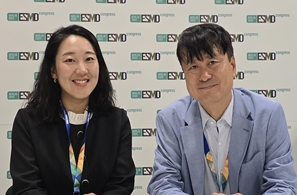- Health vice-minister answers questions on MOHW drug pricing
- by Kim, Jung-Ju | translator Byun Kyung A | Oct 5, 2020 06:21am
A month into his new appointment, the second vice-minister is in charge of the entire health sector including the healthcare and pharmaceutical industry.

During an interview with the industry news media, Vice-minister Kang affirmed his approach on the health policies and determination to communicate with the industry as much as possible. He also said more comprehensive and systematic healthcare developing roadmap would be taken by sufficiently surveying opinions from various stakeholders.
However, he was particularly careful on speaking about sensitive issues like choline alfoscerate substitution prescription and non-proprietary name prescription, coverage on Korean herbal medicine, and alternative exam date for medical school students who were on strike.
Following is the detailed interview with the vice-minister.
▶The Korean pharmaceutical industry is complaining about the skewed regulatory policy, namely the generic pricing system revision. While the administration is pressing on the coverage enhancement, the public is criticizing on the insufficient fostering initiative for the Korean pharmaceutical industry and unilateral policy execution. Regarding the criticisms, what is your opinion on them and how do you plan to approach the said policies?
“Since the valsartan contamination incident in 2018, the notion of generally amending the generic management system has been suggested. MOHW then discussed with the Ministry of Food and Drug Safety (MFDS) and collected the pharmaceutical industry’s opinions to revise the drug pricing system to ultimately improve the generic quality management and competitiveness. We would push on with the pricing policies announced already, but also sufficiently communicate with the industry when setting up detailed action plans. While streamlining the pricing system, we would constantly seek for policies to foster and support the pharmaceutical industry—the key emerging industry of the country. The ministry has drawn up and started executing the biohealth industry innovation strategy plan and the Second Five-year Comprehensive Plan (2018-2022) for Pharmaceutical Industry Fostering and Supporting, which includes R&D investment expansion, major specialist training, and biohealth technology innovation ecosystem establishment. The ministry would continue to provide supports for the industry for its further innovation and better global competitiveness.”
▶Pharmaceutical companies are urging the government to differentiate pricing as a new drug, when an anticancer therapy adds a new indication. The industry apparently wants to communicate with the government on its stance, but they say the government has not been responding. What is your opinion on the matter?
“A new drug pricing system that gives different pricings on a drug based on indication could help improving the access to needed treatments. But we need to first evaluate if such system can be realized within the current National Health Insurance (NHI) and its billing and payment system. Also, the indication-based differentiated pricing should be decided after surveying a wide array of stakeholders including the relevant government bodies, industries and civic groups. Regarding the communication with the pharmaceutical industry, the ministry would regularly convene a meeting with the related industry organizations for their in-depth opinions.”
▶Recently, the court has ruled to halt the reimbursement reduction order on choline alfoscerates. With the decision, would you say the reevaluation on other drugs are also on hold or halted as well, or that the ministry is planning to continue on with the reevaluation program according to the newly written reevaluation clause within the revised reimbursement regulation?
“So far, the National Assembly, the media and civic groups have pointed out how reevaluation is needed for those drugs with questionable clinical efficacy. As a first case, we have selected and reevaluated drugs with choline alfoscerate, and newly added a legal basis within the National Health Insurance reimbursement standard to adjust reimbursement on already-listed drugs through reevaluation. Other drugs would be reevaluated next year, and we would fully communicate with the pharmaceutical industry, experts and civic groups during the process.”
▶While the trend of pharmaceutical companies signing deals with CSOs is becoming more apparent, is there any CSO management plan including the expenditure report management the MOHW is preparing?
“There have been concerns of the industry finding new means to provide rebate as more companies are working with CSO. Accordingly, the ministry is to also seek measures, based on the Pharmaceutical Affairs Act, to prevent CSOs providing rebate by penalizing them with business suspension. Also the CSO would be responsible to document financial benefit provided to healthcare providers and to file expenditure report under the supervision of the consigner. By raising awareness of the expenditure report system that requires healthcare providers and pharmaceutical industry to verify the report, the ministry would encourage the CSOs to be better self-managed.”
▶Until now, the government has acknowledged the necessity of generic substitution and non-proprietary prescription, but turned them down due to conflict between the healthcare providers and pharmacists. What is your opinion on the issue?
“There are so many different opinions suggested by the medical and pharmaceutical experts from health industries to academic societies regarding the government promoting non-proprietary prescription and generic substitution. So we would need to first create a social consensus to reflect not only the medical and pharmaceutical industries, but also the public.”
-

- 0
댓글 운영방식은
댓글은 실명게재와 익명게재 방식이 있으며, 실명은 이름과 아이디가 노출됩니다. 익명은 필명으로 등록 가능하며, 대댓글은 익명으로 등록 가능합니다.
댓글 노출방식은
댓글 명예자문위원(팜-코니언-필기모양 아이콘)으로 위촉된 데일리팜 회원의 댓글은 ‘게시판형 보기’와 ’펼쳐보기형’ 리스트에서 항상 최상단에 노출됩니다. 새로운 댓글을 올리는 일반회원은 ‘게시판형’과 ‘펼쳐보기형’ 모두 팜코니언 회원이 쓴 댓글의 하단에 실시간 노출됩니다.
댓글의 삭제 기준은
다음의 경우 사전 통보없이 삭제하고 아이디 이용정지 또는 영구 가입제한이 될 수도 있습니다.
-
저작권·인격권 등 타인의 권리를 침해하는 경우
상용 프로그램의 등록과 게재, 배포를 안내하는 게시물
타인 또는 제3자의 저작권 및 기타 권리를 침해한 내용을 담은 게시물
-
근거 없는 비방·명예를 훼손하는 게시물
특정 이용자 및 개인에 대한 인신 공격적인 내용의 글 및 직접적인 욕설이 사용된 경우
특정 지역 및 종교간의 감정대립을 조장하는 내용
사실 확인이 안된 소문을 유포 시키는 경우
욕설과 비어, 속어를 담은 내용
정당법 및 공직선거법, 관계 법령에 저촉되는 경우(선관위 요청 시 즉시 삭제)
특정 지역이나 단체를 비하하는 경우
특정인의 명예를 훼손하여 해당인이 삭제를 요청하는 경우
특정인의 개인정보(주민등록번호, 전화, 상세주소 등)를 무단으로 게시하는 경우
타인의 ID 혹은 닉네임을 도용하는 경우
-
게시판 특성상 제한되는 내용
서비스 주제와 맞지 않는 내용의 글을 게재한 경우
동일 내용의 연속 게재 및 여러 기사에 중복 게재한 경우
부분적으로 변경하여 반복 게재하는 경우도 포함
제목과 관련 없는 내용의 게시물, 제목과 본문이 무관한 경우
돈벌기 및 직·간접 상업적 목적의 내용이 포함된 게시물
게시물 읽기 유도 등을 위해 내용과 무관한 제목을 사용한 경우
-
수사기관 등의 공식적인 요청이 있는 경우
-
기타사항
각 서비스의 필요성에 따라 미리 공지한 경우
기타 법률에 저촉되는 정보 게재를 목적으로 할 경우
기타 원만한 운영을 위해 운영자가 필요하다고 판단되는 내용
-
사실 관계 확인 후 삭제
저작권자로부터 허락받지 않은 내용을 무단 게재, 복제, 배포하는 경우
타인의 초상권을 침해하거나 개인정보를 유출하는 경우
당사에 제공한 이용자의 정보가 허위인 경우 (타인의 ID, 비밀번호 도용 등)
※이상의 내용중 일부 사항에 적용될 경우 이용약관 및 관련 법률에 의해 제재를 받으실 수도 있으며, 민·형사상 처벌을 받을 수도 있습니다.
※위에 명시되지 않은 내용이더라도 불법적인 내용으로 판단되거나 데일리팜 서비스에 바람직하지 않다고 판단되는 경우는 선 조치 이후 본 관리 기준을 수정 공시하겠습니다.
※기타 문의 사항은 데일리팜 운영자에게 연락주십시오. 메일 주소는 dailypharm@dailypharm.com입니다.
- [Reporter's View] Transparent info, the key to vaccine trust
- Reporter's view | Son, Hyung Min









